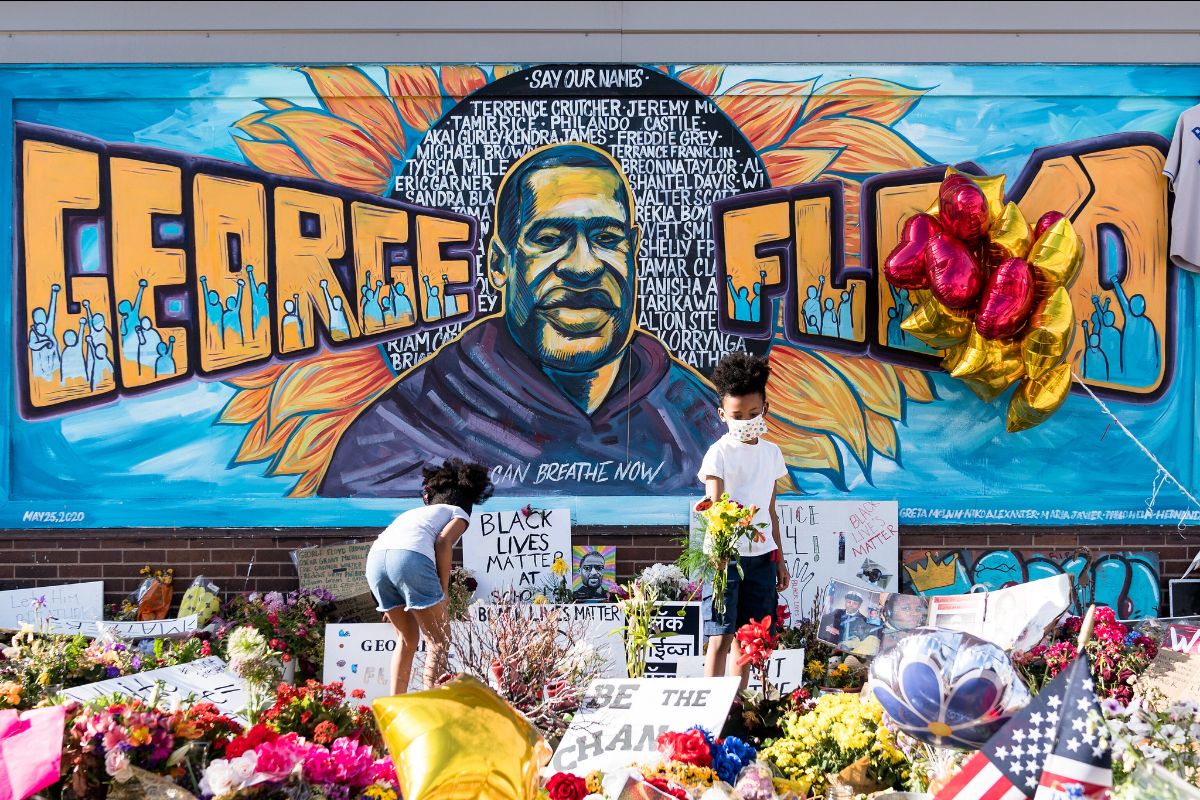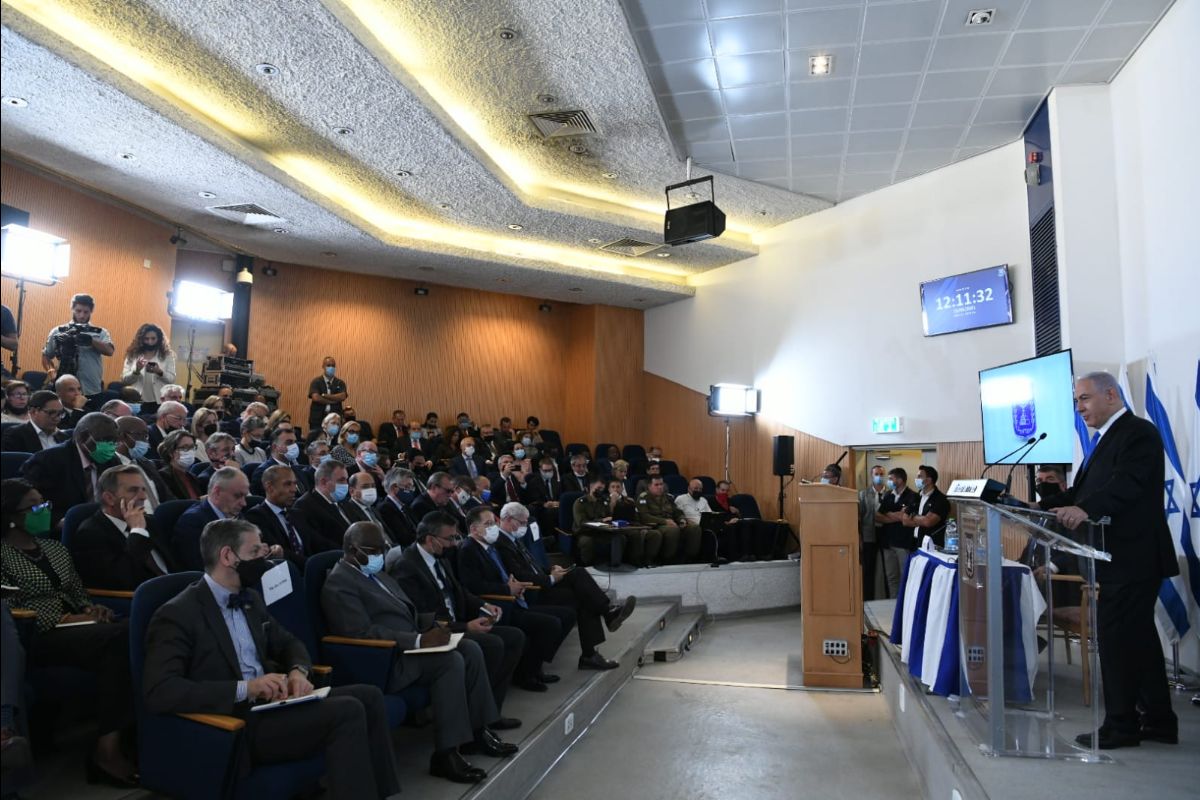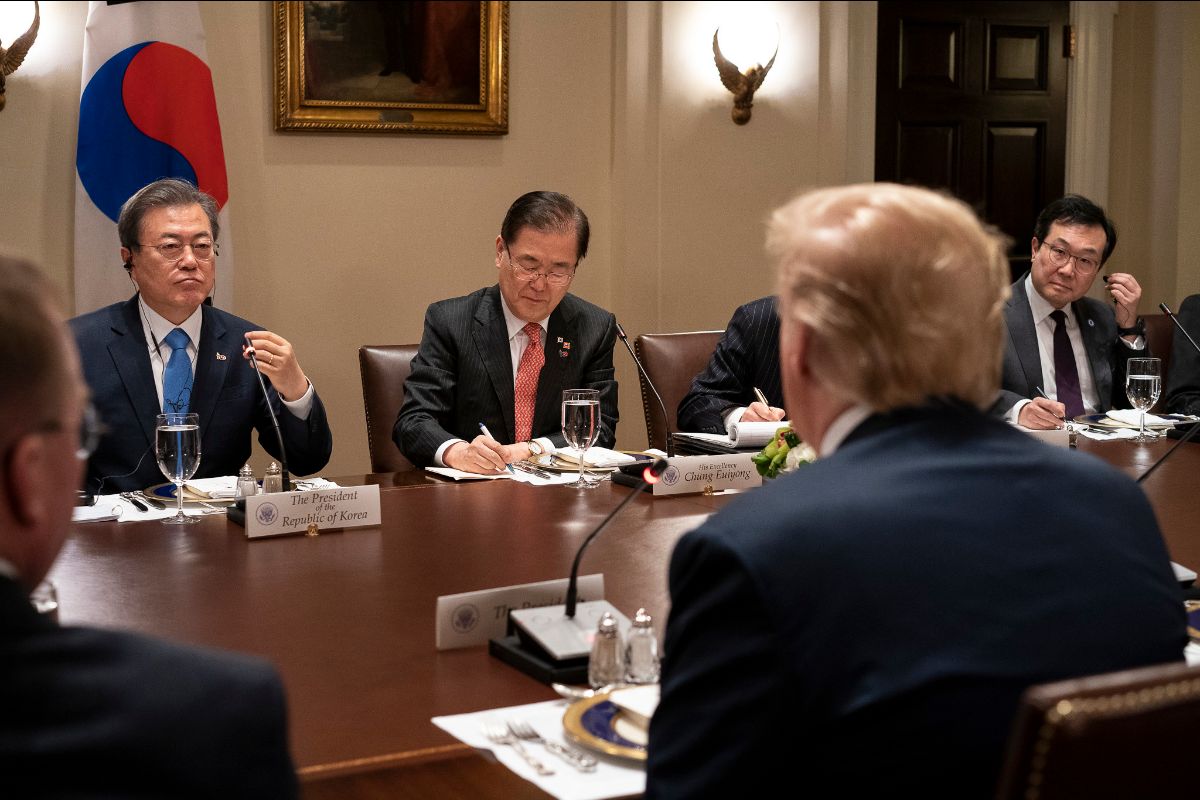Top photo: Former President Donald Trump meets with South Korean President Moon Jae-in in April 2019 at the White House. (Photo: Shealah Craighead / White House)
Welcome to Factal Forecast, a look at the upcoming week’s biggest stories and what they mean from the editors at Factal. Published every Thursday, Forecast is a newsletter to help you get a jump-start on the week ahead. Get it in your email by subscribing for free.
A look ahead:
May 21/ President Moon to visit White House: South Korean President Moon Jae-in will visit the White House on Friday in what the White House says will “highlight the ironclad alliance” between the United States and South Korea.
- What’s happened so far: Issues on the agenda for the meeting between the two leaders include the economy, trade, climate change and the coronavirus. Moon’s visit will mark the second time a foreign leader has come to the White House since President Joe Biden took office in January.
- The impact: Moon’s Senior Press Secretary Chung Man-ho said the meeting between Moon and Biden will also address measures the two countries can take to progress toward “the complete denuclearization of the Korean peninsula and a lasting peace policy.” Exactly which measures will be on the table is still unclear though as the Biden administration only recently settled on a “calibrated practical approach” to North Korea policy. Commentators and researchers said the new policy leaves some questions unanswered and Friday’s meeting between Moon and Biden may provide some answers.

May 21/ Germany to ease restrictions: Some German states will start lifting restrictions Friday after more than six months following a drop in coronavirus cases.
- What’s happened so far: Berlin has begun a progressive lifting of coronavirus restrictions this week, with a nighttime curfew ended and shopping restrictions eased as of Wednesday. The state will continue relaxing restrictions Friday if its incidence rate remains low, allowing for outdoor dining. Other states like Schleswig-Holstein plan to go a step further and reopen tourism and indoor dining Monday. The Federal Cabinet also approved some exceptions for those who have been fully vaccinated, allowing them to meet with other vaccinated people and be exempted from travel-related quarantine.
- The impact: The progressive reopening does not block states from returning to lockdown, however, with all measures contingent on case rates remaining low. German MPs passed a controversial law in April that allows the central government to halt reopening phases in the federal states or reimpose tougher restrictions if infections spike again. Looking toward the future, and taking into account that vaccinations will be open for all by June 7, the Senate is set to assess steps toward the reactivation of tourism Tuesday.

May 21/ U.S.-Canada border closure expires: The U.S.-Canada border closure is set to expire Friday, more than a year after it was imposed during the initial stages of the coronavirus outbreak in North America.
- What’s happened so far: The border closure was put into force last March, and has been extended several times due to successive waves of infection, the latest of which saw Ontario experience their highest cases numbers to date. With declining numbers in both countries. Canadian Prime Minister Justin Trudeau is said to be holding consultations on measures that will allow the border to open again. The gates aren’t expected to suddenly open come Friday, and the ban on non-essential travel will likely be extended by another month, but the talks are a sign Canada is moving toward a summer of normalcy. Additionally, President Biden set July 4 as a goal to ease nearly all restrictions, and part of that is likely to include normalized cross-border transit.
- The impact: The U.S.-Canada border is the longest continuous border between two nations, and several crossing points account for large sections of cross-border trade. Any easing of procedures will likely allow for increased economic activity. This will be welcomed after lackluster U.S. jobs numbers published last week. Isolated communities along the border are also hoping for a return to normality.

May 21/ Iran nuclear talks deadline: U.S. and European negotiators are rushing to conclude negotiations with Iran to revive the 2015 agreement that curbed its uranium enrichment by a Friday deadline.
- What’s happened so far: In February, Iran suspended most of its cooperation with the UN’s nuclear watchdog to pressure the United States into lifting economic sanctions, withholding surveillance tapes of its facilities and threatening to erase them if a deal to lift sanctions isn’t reached within a three-month period. The Biden administration is working to rejoin the agreement, which was abandoned by former President Donald Trump, as Iran continues to escalate uranium enrichment activities. The country’s economy has been crippled by sanctions on hundreds of entities, including its central bank and state-owned oil company, compounding the impact of coronavirus and fueling domestic discontent against its authoritarian government.
- The impact:The EU’s top negotiator said Wednesday all sides were moving closer to an agreement, adding they will reconvene next week to continue talks. Meanwhile, Iran is in negotiations with the International Atomic Energy Agency to extend the May 21 deadline, Mora said. A potential deal would not only boost Iran’s economy, but also present a domestic challenge to the Biden administration, which is already facing Republican criticism for adopting what they allege is a softer stance toward one of four nations the United States classifies as a state sponsor of terrorism.
May 23/ Saudi Arabian import ban on Brazil poultry: Saudi Arabia will ban imports from 11 Brazilian poultry plants starting Sunday, without giving explanation to Brazilian authorities.
- What’s happened so far: While Brazil claims 11 of its plants were excluded from the list, the Saudi Food and Drug Authority only confirmed imports from seven JBS plants were being suspended. JBS, the world’s largest meat company, acknowledged the ban but did not disclose how many of its plants were affected. According to Brazilian media, Saudi Arabia decided to block the imports as it believes the products exported by the suspended companies would have exceeded the accepted limits for microbiological contamination.
- The impact: Brazil’s Foreign Affairs Ministry claims Saudi Arabia’s decision came without allowing the possibility of a technical defense presentation by Brazil. Officials also claim the country did not receive information on which indexes were exceeded or which methodology was adopted in the analysis that led to the decision. Brazil, the world’s largest poultry exporter, could lose up to $500 million in exports because of the suspension. Saudi Arabia is Brazil’s second biggest importer, only behind China. But according to Brazil’s Agriculture Ministry, Brazilian chicken exports to Saudi Arabia have shrunk in recent years amid efforts to drive domestic production. There are fears that the situation could worsen if the kingdom goes ahead with its plans to reduce the validity of exported chickens from one year to three months.
May 24/ Aung San Suu Kyi scheduled to appear in court: Deposed Myanmar leader Aung San Suu Kyi is expected to appear in court on Monday, her first public appearance since the country’s military seized power on Feb. 1.
- What’s happened so far: In February, Suu Kyi was detained and placed under house arrest during the military coup, and has not been seen in public since. Several scheduled court delays have been delayed at the last minute, and it’s unclear if Monday’s will proceed as planned. Since the coup, activist groups say Myanmar security forces have killed at least 800 people and detained more than 4,100 others amid enduring anti-regime protests.
- The impact: Suu Kyi is charged with six alleged crimes, including violating the country’s Official Secrets Act. A conviction under the act could mean Suu Kyi would face up to 14 years in prison.
May 25/ Russia eases some travel restrictions: Regular flights will resume between Russia and locales in five more countries starting Tuesday, as the country gradually expands international travel to more destinations.
- What’s happened so far: Russia grounded all international flights at the start of the coronavirus pandemic. Since August, the country has allowed flights to and from a handful of countries, saying the decisions are based on the “epidemiological situation” abroad. In this latest travel expansion, regular air travel will resume between Moscow and cities in Iceland, Malta, Mexico, Portugal and Saudi Arabia. In addition, the number of weekly flights will increase between several Russian locations and Seoul, Helsinki, and Tokyo.
- The impact: While coronavirus cases have plateaued in Russia, the country’s vaccination effort is reportedly lagging behind its targets, making it a question as to whether travelers will be inclined to visit in the short-term.

(Photo: Lorie Shaull / Flickr)
May 25/ Anniversary of George Floyd’s death: Tuesday marks one year since George Floyd was killed by now-former Minneapolis officer Derek Chauvin. In the year since, the United States — and even some parts of the world — have seen large protests, civil unrest, and a reckoning on police violence and racism.
- What’s happened so far: Last year on May 25, Floyd, a Black man, died after being arrested outside a store in Minneapolis. A now widely-seen bystander video of the incident shows former police officer Chauvin, who is white, kneeling on Floyd’s neck for over nine minutes. A Hennepin County, Minn., jury in April found Chauvin guilty of murder and manslaughter. Chauvin faces up to 30 years in prison and is scheduled to be sentenced June 25, and three other former officers charged in Floyd’s death are set to go on trial next March.
- The impact: Following Chauvin’s murder conviction, the Department of Justice opened a probe into possible patterns of discrimination and excessive force among the Minneapolis Police Department — which follows a previously opened and ongoing DOJ criminal investigation into Floyd’s murder and whether federal civil rights laws were violated. Meanwhile in Congress, lawmakers say talks on police reform are unlikely to meet President Biden’s May 25 deadline for a deal, as negotiators say they remain at odds over whether to end qualified immunity for law enforcement officers.
May 26/ Parents of missing students protest in Iguala and Mexico City: Loved ones of the 43 students who went missing in Mexico nearly seven years ago will press for more answers in a Mexico City protest Wednesday.
- What’s happened so far: On Sept. 26, 2014, student activists from the Ayotzinapa Rural Teachers’ College were traveling to Mexico City when the buses they had commandeered were stopped by local police in Iguala, Guerrero. The full details of what happened next are unknown. It’s clear, however, the students and the police clashed, which led to the deaths of six people. According to a government report, police took many of the surviving students into custody and handed them over to the local cartel who then killed them. But many people disagree with that finding, with some citing involvement by the Mexican Army and federal police. In November, a soldier linked to the disappearance was arrested. Relatives of the missing students, who have periodically gone on searches for the remains, announced they would resume the search this month and hold demonstrations in Iguala and Mexico City.
- The impact: This event was a flashpoint for Mexico and two of its government’s main issues: cartels and corruption. The country was shocked by what happened, but not much has changed since then. In the years following the crime, the parents and loved ones of the missing students have been vocal about wanting to know what happened and they’ve continued to pressure the government, hoping to change the culture.
May 26/ Syrian presidential election: A decade after the Syrian civil war began, President Bashar al-Assad looks certain to tighten his grip on power in Wednesday’s presidential election, which has been condemned as farcical by the opposition and international community.
- What’s happened so far: While Syria’s constitutional court received some 51 registrations from potential candidates, it has allowed just two to appear on the ballot alongside al-Assad: a former deputy cabinet minister and the leader of an authorized opposition party. Assad’s certain victory will return him to power for a fourth seven-year term, further prolonging the civil war as his administration is not willing to engage in meaningful negotiations to end the conflict.
- The impact: Wednesday’s election has been universally condemned by Western nations and international organizations as a sham, meaning any results will not be viewed as legitimate. The UN stresses it is not involved in the poll and continues to call for a “negotiated political solution,” while the U.S. State Department said the vote will be neither free nor fair.

What else matters:
Israel ceasefire talks: The United States, European Union and United Nations are working to end the worst outbreak of violence in Israeli-Palestinian territories in seven years. Israeli airstrikes in Gaza Strip have killed more than 200 Palestinians and destroyed critical infrastructure, while retaliatory militant rocket fire has killed 12 Israelis. Despite growing international pressure, neither side has publicly expressed willingness to halt hostilities.
- Watch for: The Biden administration said it’s engaging in “quiet, intensive diplomacy” aimed at ending the fighting, amid rising criticism from Democratic lawmakers of its ongoing support for Israel. President Biden publicly stopped short of calling for a ceasefire, telling Israeli Prime Minister Benjamin Netanyahu he expected “significant de-escalation.” Airstrikes have targeted civilian residential buildings, press offices and electricity and water supplies, actions that rights groups say may rise to the level of war crimes. Arab mediators are also speaking with Hamas. The Gaza Strip-based militant organization that has fired most of the 3,000 rockets at Israeli civilians in less than two weeks claims it’s battling on behalf of all Palestinians following Israel’s crackdown on protests in East Jerusalem and efforts to displace its residents with Jewish settlers.
Belarus opposition crackdown: Embattled Belarus strongman Alexander Lukashenko’s crackdown against opposition continued this week as authorities raided the country’s top independent news outlet Tut.By. Authorities said the raids, which targeted the outlet’s offices as well as the home of Editor Marina Zolotova, were over “large-scale tax evasion.” Authorities blocked the Tut.By domain, though the outlet continues to publish for the time being on prominent social media outlets such as VK and Telegram.
- Watch for: The crackdown is situated within the broader consolidation of Lukashenko’s power after the most widespread protests against his authoritarian rule since his ascension to power in 1994 following last August’s disputed presidential election. Sviatlana Tsikhanouskaya, the opposition candidate in those elections that subsequently fled the country, implored the international community to condemn the suppression of free media. With Tut.By being the main independent outlet in Belarus covering the anti-Lukashenko protests in detail, the crackdown appears designed to produce a chilling self-censorship effect.
Extended outlook: What’s on our radar in the coming weeks
May 20: Somalia state leaders meeting
May 21: South Korean President Moon to visit White House; U.S.-Canada border closure set to expire; Germany starts to ease restrictions; Iran nuclear talks “deadline”
May 23: Saudi Arabia bans poultry from 11 Brazilian processing plants
May 24: Aung San Suu Kyi to appear in court
May 25: Anniversary of death of George Floyd; Russia restarts air travel with multiple countries
May 26: Travel bubble between Hong Kong and Singapore scheduled to begin; parents of missing students protest in Iguala and Mexico City; Syrian presidential election
May 29: UEFA Champions League Final
June 1: Special election for New Mexico’s 1st congressional district
June 5: Ethiopian parliamentary election
June 6: Federal elections in Mexico
June 8: Vice President Kamala Harris to visit Mexico
June 11: G7 Summit in Cornwall, England
June 12: Algerian legislative elections; Trooping the Colour military ceremony in London
June 14: NATO summit in Brussels

